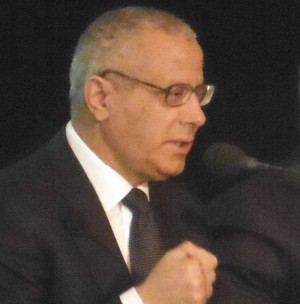By Libya Herald reporter.

Tunis, 25 August 2017:
Former prime minister Ali Zeidan who was released by his abductors on Tuesday after being held for ten days in Tripoli, has said that they constantly tried to find evidence of wrongdoing against him but failed.
They had even gone to the offices of both the prime minister and the attorney general in their search, he said.
Speaking to the Libya Herald in Tunis, to where he flew on Thursday evening from Tripoli, he said that he had himself gone voluntarily to the public prosecutor’s office after he was released to ensure that there were no pending charges against him. He was assured by the public prosecutor, and the head of investigations that there were none.
Explaining the circumstances of his abduction, he said that he had gone to Tripoli, having first informed Presidency Council (PC) head Faiez Serraj. The latter had organised his stay and that of those accompanying him at the Victoria Hotel, off Shara Omar Mukhtar.
Two days after his arrival, early in the morning an armed group had arrived at the hotel demanding to know if he were there. Staff initially denied this, but the group, headed by Mohamed El-Bagbag, were insistent. Finally, after several hours, they managed to seize him.
Bagbag is one of the top assistants to Haithem Tajouri.
Zeidan was then taken to their offices near the Watania TV station on Shara Al-Shatt. There he was locked in room that had some sofas but not much else, although there was also a bathroom attached. His phone and other belongings were taken away from him.
His captors demanded to know who had given him permission to go to Tripoli.
“I told that I did not need permission, that it was my right as a Libyan. But I also told them that I had informed Faiez Serraj who had welcomed my visit.”
He was told on several occasions that Tajouri would come to speak to him. It never happened.
He says he was fed and properly treated although it was only on the third day that his captors gave him a blanket.
On the tenth day, he was suddenly freed with no explanation. He was then taken to the Mehary Radisson Blu hotel nearby. However, the abductors did not give him back his phone, nor a small recording device he had, nor some LD 2,000 in Libyan and foreign cash.
At the hotel he was phoned by Serraj who wanted to confirm that he had arrived safely.
Following his release he contacted the public proscutor’s office for an appointment to verify that there were no charges pending against him. He was told that he did not need to go because there were none. However, he insisted on going. There, he said, he met both the public prosecutor and the head of investigations who assured him that there was nothing to worry about, that there were no charges against him.
As to why he had been abducted, a close colleague of Zeidan, speaking separately to this newspaper, claimed that Tajouri was making a political point.
“He wanted to show that he is in charge of Tripoli, not Serraj, not anyone else.”
But in the end, he added, as international attention started to focus on the case, Tajouri had become afraid that he might charged by the ICC with kidnapping or expose his assets abroad to confiscation, he said.
He was particularly angry with the stance taken by Serraj.
“A former prime minister was kidnapped in Tripoli and he said nothing. He has still not made a statement about it. It is appalling.”
The whole incident had exposed Serraj’s complete weakness, he claimed.
“He only has power abroad, not in Libya.”
The real power in Tripoli was Tajouri, he claimed, and Tajouri had not wanted Zeidan to be there or Serraj to talk to him. He claimed that once Zeidan had been seized, Serraj then tried to keep the story out of the news because it was embarrassing to him.
He also accused Serraj of dishonesty when he told the southern delegation that went to Tripoli last Sunday to demand Zeidan’s release that he was initially unaware of its presence but had immediately agreed to a meeting when he was informed about it.
He met the group on Monday.
“It was [PC deputy Abdelsalam] Kajman who was delegated to met them on Sunday. How could Serraj not have known?”, he asked rhetorically.
The colleague, who said he had been in touch with the members of the delegation, disclosed that they had told Kajman that they did not want to speak to him, that the only person they wanted to see was Serraj and that if they did not see him straightway, water supplies to Tripoli would be stopped and the oil pipelines from the south blocked.
The threat, he said, was repeated on Monday when Serraj ageed to see the delegation, led by former deputy local government minister Ali Saeed Nasr and consisting of representatives from all tribes and groupings in the south, even those normally opposed to each other. Serraj was told that if Zeidan were not free within 72 hours then the water and fuel would stop.
“He replied that it would happen within 24 hours, at most 48.”
Zeidan was freed the next day.






